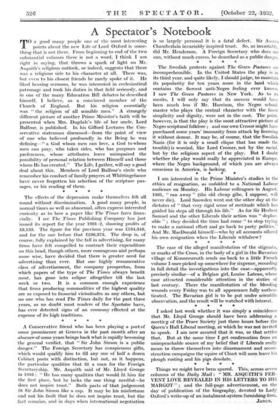A Spectator's Notebook
TO a good many people one of the most interesting points about the new Life of Lord Oxford is some- thing that is not there. From beginning to end of the two substantial volumes there is not a word, I think I am right in saying, that throws a spark of light on Mr. Asquith's religious outlook, or indeed, suggests that there was a religious side to his character at all. There was, but even to his closest friends he rarely spoke of it. He liked hearing sermons, he was interested in ecclesiastical patronage and took his duties in that field seriously, and in one of the many Education Bill debates he described himself, I believe, as a convinced member of the Church of England. But his religion essentially was " the religion of all sensible men." A strangely different picture of another Prime Minister's faith will be presented when Mrs. Dugdale's life of her uncle, Lord Balfour, is published. In his Gifford Lectures the Con- servative statesman discussed—from the point of view of one who believed profoundly in the Being he was defining—" a God whom men can love, a God to whom men can pray, who takes sides, who has purposes and preferences, whose attributes leave unimpaired the possibility of personal relation between Himself and those whom He has created." The Life, I gather, will say a good deal about this. Members of Lord Balfour's circle who remember his conduct of family prayers at Whittingehame have never forgotten his selection of the scripture pas- sages, or his reading of them. * * *














































 Previous page
Previous page